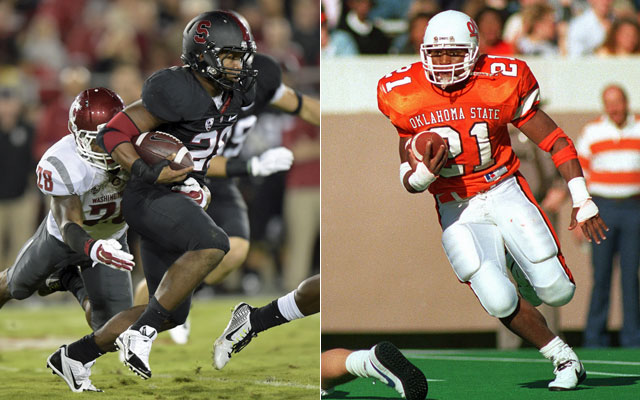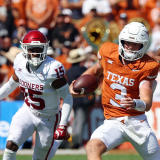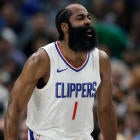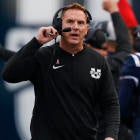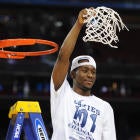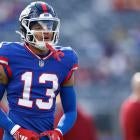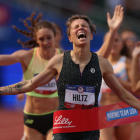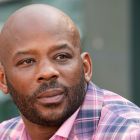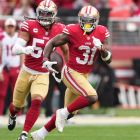STILLWATER, Okla. -- It’s an identity crisis Barry Sanders wants cleared up right away.
Don’t refer to him as Barry Sanders Jr., says the son of the football great whose name he shares.
Don’t even go there with the casual one-word handle either. For the better part of three decades on the Oklahoma State campus, “Barry” has meant one thing, one man.
There needs to be some separation. That’s why the son of a hall of fame father wants to make sure you get his handle right.
“It’s Barry James [Sanders],” he said, stressing the middle name. “People around here call me Barry J.”
So it is Barry J. Sanders, the Stanford tailback who transferred to Oklahoma State for his final season of eligibility. That’s what you read on the transaction wire.
Of sound mind and body, the 21-year-old son of the Barry Sanders is facing one of the most revered legacies of all-time.
That legacy is one of an NCAA single-season rusher leader, Heisman Trophy winner and football legend.
“I wouldn’t say comparisons are the worst,” Barry J. told CBS Sports. “I’ve had comparisons my whole career. I don’t see it being any less than it normally would.”
To be clear: Dad is the icon with an NCAA-record 2,628 yards for the Cowboys in 1988. Dad is the NFL’s No. 3 career rusher. Son, well, he has 672 career yards in three seasons at Stanford.
Barry J. officially announced in February he would be a graduate transfer. What awaits are shoes to fill the size of Boone Pickens Stadium.
But … why? At every turn, won’t it be human nature for, well, everyone to compare Barry J. Sanders to Barry Sanders?
“When I made the decision, I knew I wanted to take my fifth year elsewhere,” Barry J. said. “I knew I wanted to be around as many familiar people as I could. I wanted to be in a place where I could compete for the starting job. It made great sense for me to go to Oklahoma State.”
The kid says he loves Stanford and will never forget his time there. The kid also says he knows what he’s getting into. This is one season, not four. He’ll arrive with a communications degree from Stanford, which sets him up for life even if he never puts on another pad.
The Cowboys -- the region -- will welcome him with loving arms. Part of him grew up here. His friends and family are in nearby Oklahoma City where Barry J. led Heritage Hall High School to a state title.
His current situation is more than unique. Perhaps it would be different if his first name didn’t match his dad’s. But it does. Same name playing the same position at the same school as his father.
Jarrett Payton, Walter's son, was also a running back but played at Miami. Joe Montana had two quarterback sons. One played sparingly at Notre Dame. Michael Jordan’s son, Marcus, played basketball at UCF -- relatively quietly.
Our dads were 2 of the best to ever do it. Great to see my lil bro @BarryJSanders26. #SB50 pic.twitter.com/QnnjVTpBPY
— Jarrett W. Payton (@paytonsun) February 8, 2016
Not even Jerry Rice Jr. matches the criteria. He played at UCLA, time zones away from Mississippi Valley State.
Cowboys coach Mike Gundy throws out names like Jim Brown, Walter Payton and Billy Sims as potential comparisons to Barry Sanders, but notes, “It’s not even a fair argument. Once you get to that level, it doesn’t matter."
On the inevitable issues with son following father: “I think there was an issue with [comparisons]. ‘Do I really want to listen to that for four years?’ … Now he’s a college graduate. He’s here. His mom is in Oklahoma City. He’s got all of his friends. It’s not as demanding as it was out there [at Stanford]," Gundy explained.
There are demands and there is following arguably the best college player of his generation who just happens to be dad. Barry Sanders famously walked away early from his NFL career with the Detroit Lions after 10 seasons. Son is just trying to duck his head in the huddle.
“I just don’t know what it feels like to have 25 carries,” said Barry J., who never carried more than 10 times in a game at Stanford.
Dad thrived on such a workload. Barry J. was a complementary back in Palo Alto, California, who at various times in his career was stuck behind Stepfan Taylor, Tyler Gaffney and -- most recently -- Heisman Trophy runner-up Christian McCaffrey, himself the son of a well-known NFL player in Ed McCaffrey.
“Just not having those carries is a disadvantage because there’s so much comfort in knowing what you’re getting yourself into,” Barry J. said. “I would say that’s the only frustration.”
You’d transfer, too -- even if it is from The Farm to surrounding farmland. Players want to play.
“Thank goodness,” said former Cowboys defensive lineman Stacey Satterwhite, who played with Barry Sanders 28 years ago as a freshman. “We need him.”
This is a football decision more than anything else. Sure, he grew up in nearby Oklahoma City. Barry J. has been to what is now Boone Pickens “dozens” of times. That massive trophy case in the stadium isn’t the only reminder here of what his father did in Stillwater.
Oklahoma State needs a running game whether it’s provided by Col. Sanders or Barry Sanders. The Cowboys were 114th in rushing last season. Only five Power Five programs were worse.
The program that pumped out dominating rushers in Terry Miller, Ernest Anderson, Thurman Thomas, Sanders and Gerald Hudson was fairly one-dimensional. That might have been the difference between a 10-win season and a playoff berth.
Gundy’s plan is to get Barry J. 12 touches a game. That’s about 150 for the season. That doesn’t calculate out to 2,600 rushing yards. But for one year -- his last in college -- why not play in a friendly cocoon where he basically grew up?
“I don’t know Barry J. at all,” said Steve Buzzard, Oklahoma State’s former sports information director during Barry Sanders’ career. “I would think to him it’s an opportunity to connect the dots on his dad’s legacy. I certainly think he’ll add a lot to this team. Enough time has passed there will be the inevitable comparison.
“Really, come on? Barry Sr. was the best player to wear the uniform. It would be hard for anybody to follow that.”
Legacy? This place is dripping with it. Sanders’ Heisman is prominently displayed. His No. 21 jersey is encased behind glass. The Barry Sanders Supercenter on 6th Ave. here might be the biggest car dealership in town.
“We firmly believe he’s the greatest running back of all time,” said Larry Reece, the P.A. voice of Cowboys football and basketball. “Our only national championship in football is Barry Sanders.”
The 1988 Oklahoma State team lost only to Nebraska and Oklahoma. The 63-42 loss to the Huskers is known more for Sanders’ six touchdowns than Nebraska’s W.
Stillwater was about to come apart later that season against Oklahoma until Brent Parker dropped a pass.
Those Cowboys were the highest scoring team in the land. They featured Sanders, All-American receiver Hart Lee Dykes and Gundy. They were dubbed "The Triplets" before the Dallas version of the Cowboys had even assembled Troy Aikman, Michael Irvin and Emmitt Smith.
“If we had any defense, we might have won a national championship,” said Reece, one of the few folks in town who can say they interacted with Sanders back then. “We’re still a little sore about that.”
That year, Satterwhite was a green newbie from a small town of 800. By the third game of the season, he was finding himself in the defensive line rotation.
“[Barry] was the guy that always had good words to say to me,” Satterwhite said. “He was running for the Heisman and here I was a freshman from an eight-man school who had an opportunity to start playing.”
The Tokyo trip is burned into the memories of everyone who lived it. That year, Oklahoma State traveled to Japan to play Texas Tech in one of those neutral site games -- this one at the end of the season, sponsored by Coca-Cola.
Because of the time difference, Sanders was being announced as the Heisman winner 14 time zones away at about 4:30 a.m. local time.
For the first and only time, there was a good chance the best player in the country would not appear on live television to accept the award.
“We got there maybe four days before the actual presentation,” Buzzard recalled. “After practice Barry came up to me and said, ‘I don’t know if I want to do that. It’s game day. I’ve got a game day routine. We’re here to play and win a football game.’"
CBS had arranged for Sanders to be at the network’s Tokyo news bureau for a satellite uplink. When then-CBS Sports producer Ed Goren heard about Sanders’ unwillingness to appear, he freaked.
“I think he called me names I haven’t been called since,” Buzzard said.
Sanders eventually agreed to go on but only if he was surrounded by his offensive line.
All of it sounds about right, Barry J. said. Barry Sanders didn’t hate the media; it just wasn’t something he needed in his life.
“I think he showed up 20 minutes late for his own pro day,” Barry J. said, laughing.
The son can’t know the full legacy that awaits him. He can’t comprehend the implications of dad’s habit of handing the ball directly to an official after touchdowns. The practice has become retro-chic.
The anti-celebration celebration has come full circle. It’s so mundane, it’s now cool.
“He wouldn’t spike it,” Reece said. “Barry made that kind of in vogue.”
Barry truly was The Big Humble. Seven times he rushed for at least 200 yards in 1988. Each one of his 99 college rushing touchdowns ended with that simple hand-off to an official. No jumping, no celebrating. Just another day at the office.
“He didn’t play for records. He didn’t play for himself. There was always a greater good in it,” Buzzard said.
It has taken an NCAA rule change for pretenders to even challenge Barry Sanders’ single-season record, which he set in 11 games in 1988.
Wisconsin’s Melvin Gordon got close to Sanders’ single-season record in 2014 (2,587 yards), but it took him 14 games in an era where all postseason games count. Alabama's Heisman winner, Derrick Henry, crept close with 2,219 yards in 15 games last season.
Sanders’ 222 rushing yards against Wyoming in the Holiday Bowl 26 years ago would have pushed his season total to 2,850 yards.
Meanwhile, Barry J. has rushed for an average of 20 yards per game in his career.
In the face of all the years, all the yards and all the glory accumulated by his dad, the son will attempt to start his own truncated legacy next month. Believe it or not, Barry J. Sanders will be taking his official recruiting visit to Oklahoma State on April 16, the date of the spring game.
Soon after, he’ll enroll at the program where his dad’s image, accomplishments and past are everywhere.
“First thing is [to] meet my teammates,” Barry J. said. “I hope to be one the guys.”
